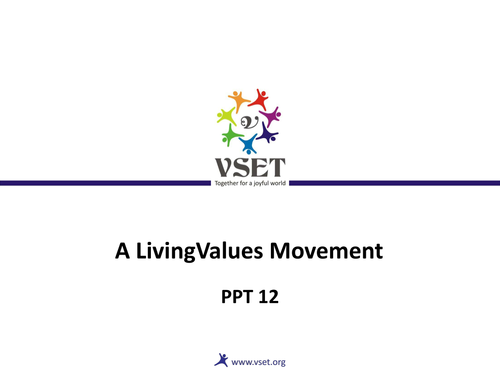

During the sessions, the facilitator is encouraged to allow the participants to think about the topic, express their viewpoints, share their experiences and explore its applicability in day to day life. The facilitator would allow the participants to arrive at their own conclusions, rather than imposing his views or opinions – they could even be different from the thoughts given here.
DESCRIPTION
(Thoughts such as, what do respect and reverence mean, what it is all about and what its different facets are, may enable the facilitator understand it better. Some such thoughts about respect and reverence are given below.)
1. Respect is the feeling of regard for someone or something – living or non-living.
INTENT
(The objective of the facilitation process is to help each participant explore the topic for himself, individually and independently. Following are some of the objectives of the session.)
1. To understand what is respect
2. To analyse whether one needs to respect others - living or non-living
3. To analyse the impact of respect on people, situations
4. To analyse why one respects people/things
5. To analyse who / what we respect and why
6. To analyse whether one needs to respect oneself
QUESTIONS
(These are some leading questions that the facilitator may contemplate on for understanding and connecting with the topic.)
1. What is respect?
2. Why do we respect others?
3. Towards whom do we feel respectful? And how?
4. Towards whom do we show respect? And how?
5. What does 'commanding respect' and 'demanding respect' mean?
6. Is it necessary to respect oneself? If yes, how is it possible?
DESCRIPTION
(Thoughts such as, what do respect and reverence mean, what it is all about and what its different facets are, may enable the facilitator understand it better. Some such thoughts about respect and reverence are given below.)
1. Respect is the feeling of regard for someone or something – living or non-living.
INTENT
(The objective of the facilitation process is to help each participant explore the topic for himself, individually and independently. Following are some of the objectives of the session.)
1. To understand what is respect
2. To analyse whether one needs to respect others - living or non-living
3. To analyse the impact of respect on people, situations
4. To analyse why one respects people/things
5. To analyse who / what we respect and why
6. To analyse whether one needs to respect oneself
QUESTIONS
(These are some leading questions that the facilitator may contemplate on for understanding and connecting with the topic.)
1. What is respect?
2. Why do we respect others?
3. Towards whom do we feel respectful? And how?
4. Towards whom do we show respect? And how?
5. What does 'commanding respect' and 'demanding respect' mean?
6. Is it necessary to respect oneself? If yes, how is it possible?
Something went wrong, please try again later.
This resource hasn't been reviewed yet
To ensure quality for our reviews, only customers who have downloaded this resource can review it
Report this resourceto let us know if it violates our terms and conditions.
Our customer service team will review your report and will be in touch.
£0.00